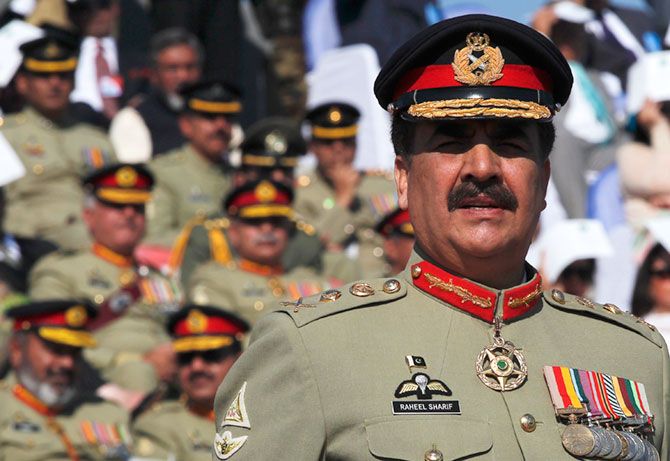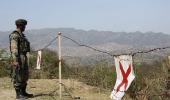'Its internal economic rot and corrupt political elite have made the resurgent supremacy of the military establishment more invincible,' says Sunil Sethi.

'He has turned war into a national industry,' said the French philosopher Voltaire of his friend and patron King Frederick of Prussia after the two had a bad falling out.
For years Voltaire tried to persuade the king to stop waging senseless, wasteful attacks on his neighbours, but to no avail.
Such was the temper and tenor of the 18th century that the Prussian king -- a remarkable military commander and enlightened reformer -- came to be known as Frederick the Great. No such appellation is likely to attach itself to Pakistan's rulers and generals in posterity.
Before the terrorist raid on the army base in Uri there was the infiltration of the Pathankot air force station in January 2016, and before that, the Gurdaspur killings in July 2015... and so the list goes on.
In between there have been numerous blasts in Kashmir, India's Achilles heel, which has all but shut down since the death of Burhan Wani in July. Extolled by Pakistani Premier Nawaz Sharif at the UN, the 22-year-old Hizbul Mujahideen leader has found a heroic afterlife he could hardly have dreamed of in his short, desperate life on earth.
Pakistan's persistent low-level cross-border jihadist incursions are a takedown from the audacious storming of the Indian Parliament in 2001 or the siege of Mumbai in 2008. But post-Uri, they are perceived as belligerent aggression.
The BJP's former foreign minister Yashwant Sinha sees them as 'acts of war' that demand 'an appropriate military response... a cool, well-planned and well-timed response, which will fetch us the desired results.'
Others, including Business Standard columnist Ajai Shukla, point to the limited options of achieving this end: Deep-penetration retaliatory strikes inside the LoC means a swift ascent up the 'escalation ladder' and full-scale war. The cost to two nuclear nations of such a dystopian eventuality can be imagined.
It is said of Pakistan that what is good for the Fauji Foundation is good for the country.
If anything, its internal economic rot and corrupt political elite have made the resurgent supremacy of the military establishment more invincible.
Earlier this year when Nawaz Sharif travelled for a minor heart surgery to London he commandeered a wide-bodied PIA 777 Boeing to cart off his family and staff to establish a 'camp office' there, at a cost, it was speculated, of 30 to 40 crore Pakistani rupees.
The columnist Ayaz Amir in a piece titled 'What have we done to deserve this?' burst out in rich hyperbole: 'Ye gods, we know we have sinned and many are our errors and omissions. But do we deserve this? Is Pakistan someone's personal jagir that you do with it as you please?'
More even-handedly, another commentator observed: 'Our law libraries in Pakistan have no shelves left to accommodate the tomes of legislation passed to hold the corrupt accountable.'
From being a client State of the US to the abandoned protege of Saudi Arabia (too many troublesome Shias) it has become China's Cinderella in the region.
The backward Shia-dominated province of Balochistan, rich in deposits of oil, gas and minerals, is where China is investing $46 billion to create the China-Pakistan Economic Corridor and develop the port of Gwadar.
Worldly Pakistanis harbour no illusions as to where some of this money may end up. Their recourse is often scathing wit. Learned historian and columnist F S Aijazuddin writes in Dawn: 'Once, the Sharifs looked towards Washington and Riyadh for succour and protection. Now, they look eastwards -- towards Beijing. Short of renaming Islamabad Little Beijing, they are doing everything to ensure that China converts an inefficient, cleric-ridden, theocratic Pakistan into a Muslim facsimile of what was once a medieval, backward, lama-infested Tibet.'
On virtually every development indicator, from poverty to birth rate, life expectancy, female literacy and elementary health, Pakistan lags woefully behind others in the SAARC grouping. It has been unable to hold a comprehensive, reliable census since 1998.
When Marc-Andre Franche, UNDP's country director for four years and a sympathiser, left Islamabad last month, he gave a surprisingly candid interview: 'You cannot have a political class in this country that uses its power to enrich itself, and to favour its friends and families.' He compared the Federally Administered Tribal Areas that border Afghanistan 'as institutionally living in the 17th century.'
Over numerous professional visits to Pakistan since 1977, when I first went when Atal Bihari Vajpayee was foreign minister in the short-lived Janata Party government and General Zia-ul Haq ruled the roost, I have come away feeling like a trip to a hall of mirrors that distort your image in ever more bizarre distortions: Almost every conceivable ill of India appears magnified.
Tragically, there is no Voltaire of our age to warn of the consequences of warmongering, nor any leader to emerge with the halo of greatness.











